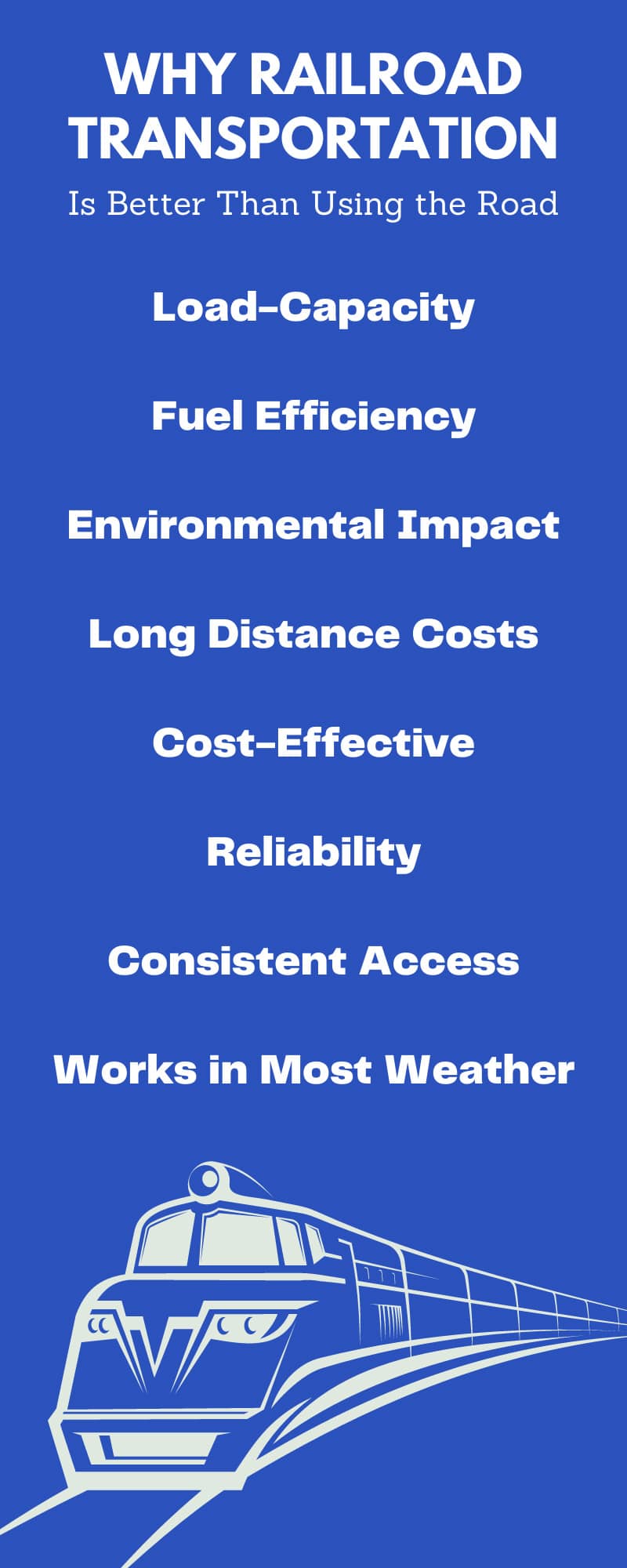
There are many forms of transport when you’re moving freight from one area to another. However, the most common forms of land transportation in the United States are road and railroad. Since the Civil War, which saw a huge increase in railroad infrastructure, freight trains have become efficient in transporting items across the country. This is just one reason why railroad transportation is better than using the road for your shipments. Here’s a simple breakdown of why you should consider using railroads for your transports.
Load-Capacity
The first benefit that railroad transport has that road transport struggles with is larger load size. A single freight train can carry a lot more equipment and materials than any single vehicle on the road. If you travel on the road, you need multiple vehicles to compete with the load capacity of railroad transport. Hiring more vehicles can get costly, especially with larger loads.
Fuel Efficiency
Another reason why railroad transport is better than road travel is the fuel efficiency they offer compared to hiring vehicles. Railways can consume up to nine times less fuel for every ton they carry for a kilometer, making trucks fuel inefficient compared to railroad transport. Fuel costs paired with the inevitability of inflation mean fuel inefficiency can really hurt your business in the long run.
Environmental Impact
This fuel efficiency ties directly in with the environmental impact you have when transporting goods. Railroads emit less greenhouse gas than vehicles by up to 75 percent for the same load. Plus, with careful planning, railroads can carry more per trip, saving emissions that might otherwise go into the air.
Long Distance Costs
One thing that makes railroad transport so good is the lower costs it has on longer trips. Although road transport is better for short trips in terms of cost, railroads cost significantly less the further they carry a load. This is due to their higher upfront cost but lower per-mile costs.
Cost-Effective
All of these factors combine to make railroad transit cost-efficient for anyone switching from vehicle transport to freight trains. Some estimate that you can save anywhere from 10-40 percent, depending on the conditions and specifics of your transport. This is because driver and fuel costs are lower for rail transit than road transit.
Reliability
Another thing you can count on with railroads is they can always accomplish the job you have. A freight train can carry large loads that vehicles could never manage, making trains superior in that regard. So ordering a freight train will give you a lot more room to work with, and they’ll always come through for you.
Consistent Access
Road transportation uses more workers and drivers for their transportation, which means that they suffer from higher turnover and worker shortages. This means that you may not have access to road transportation at all times if they’re missing too many people. Freight trains don’t have the same issues and always have people for your shipments.
Works in Most Weather
Along with the railroad’s ability to work at your speed, they can also work in almost any weather that isn’t a natural disaster. Road transport can’t work when the weather gets too bad, delaying your shipments. Luckily, trains don’t have the same risks as road shipment vehicles, so they can work in whatever weather’s happening. This means that once your shipments are on the way, you can expect little in the way of delays.
Some Cons
All these things are good for a transportation system, but railroad transportation isn’t without its flaws. Although it’s typically better than road transportation, there are times when road transport is more effective for you.
Direct Delivery
Trains are stuck on their tracks, unable to deliver directly to whatever location you have. While freight trains can do most of the delivery, transporting the load from a train via aggregate railcar unloading systems is another step in the process. However, there are plenty of options for good transport from the load drop off, and it’s quick because of equipment like railcar unloading conveyors.
Better for Perishables
Most railroads don’t guarantee delivery time, unlike some road transportation, which is useful for items you need at a specific time. Anything time-sensitive, like food or other perishables, will do better with road transportation because of the time variance in railroad transport. However, if you can wait for delivery, railcar transport can still save you money if the items travel a long way.
On-Demand Scheduling
Railroads don’t follow a strict schedule in most cases, only delivering when available for delivery. You shouldn’t have to worry about this, as many trains travel the country at any time. However, road shipments may be better than freight trains if you need to quickly transport time-sensitive items, as they come when you request them. That is, however, if they have the drivers or vehicles.
Intermodal Transportation
All these pros and cons between railroad and road transit only go to show why railroad transit is better than using the road for long distances, but also that the road is great for short distances and quick shipments. One thing that’s becoming more popular is intermodal transportation. This technique is the process of using different types of transit to move the same load wherever you need it. This is most common when using vehicles that bring a load to a railroad and then transfer the load onto a freight train. The load then travels along the train until you have it unloaded onto another road transport, which brings it wherever you need it.
This eliminates a lot of the limitations with train transportation and reduces environmental impact and the costs of transportation. Although you can save money on longer shipments and benefit the environment by moving loads by train, road transmission can still be useful when moving freight anywhere nearby. It’s in your best interest to use both methods. Also, use best practices to reduce the issues that come from intermodal transportation and the transportation’s methods.
Now, this is all to say why railroad transportation is better than using the road for long-distance transport but combining the two may create a more efficient system than using just one.

